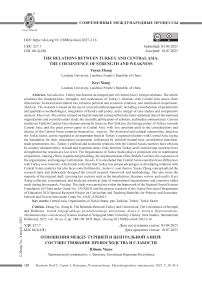The Relations Between Turkey and Central Asia: The Coexistence of Strength and Weakness
Автор: Zhang Yu., Xiang K.
Журнал: Вестник ВолГУ. Серия: История. Регионоведение. Международные отношения @hfrir-jvolsu
Рубрика: Современные международные процессы
Статья в выпуске: 4 т.30, 2025 года.
Бесплатный доступ
Introduction. Turkey has become an integral part of Central Asia’s foreign relations. The article examines the characteristics, strengths, and weaknesses of Turkey’s relations with Central Asia across three dimensions: historical and cultural ties, bilateral political and economic relations, and multilateral cooperation. Methods. The research is based on the use of a mixed-method approach, including a combination of quantitative and qualitative methodologies, integration of history and policy, and a merger of case studies and comparative analysis. Materials. The article is based on factual material extracted from the latest statistical data of international organizations and countries under study, the scientific publications of scholars, and media commentaries. Current studies on Turkish-Central Asia relations primarily focus on Pan-Turkism, the foreign policy of Turkey towards Central Asia, and the great power game in Central Asia, with less attention paid to the considerations and choices of the Central Asian countries themselves. Analysis. The historical and cultural connections, based on the Turkic factor, can be regarded as an important bond in Turkey’s regional relations with Central Asia, laying the foundation for their educational cooperation. Influenced by political mutual trust, presidential transition, trade construction, etc., Turkey’s political and economic relations with the Central Asian countries have obvious by-country characteristics. In trade and economic terms, links between Turkey and Central Asian countries have strengthened but remain at a low level. The Organization of Turkic States plays a prominent role in multilateral cooperation, making efforts in partnership building, the implementation of the Middle Corridor, the expansion of the organization, and language Latinization. Results. It is concluded that Central Asian countries have differences with Turkey over interests, which leads to the fact that Turkey has unique advantages in developing relations with Central Asian countries but also faces some bottlenecks. Authors’ contribution. Yuyan Zhang conceptualized the research topic and elaborately designed the overall research framework and methodology. She also wrote the majority of the original draft, covering key sections such as the introduction, literature review, and results. Keyi Xiang collected, systematized, and analyzed statistical data of international organizations and countries under study during the research.
Central Asia, Organization of Turkic States, pan-Turkism, Turkey, Turkic factor
Короткий адрес: https://sciup.org/149149148
IDR: 149149148 | УДК: 327.7 | DOI: 10.15688/jvolsu4.2025.4.16


